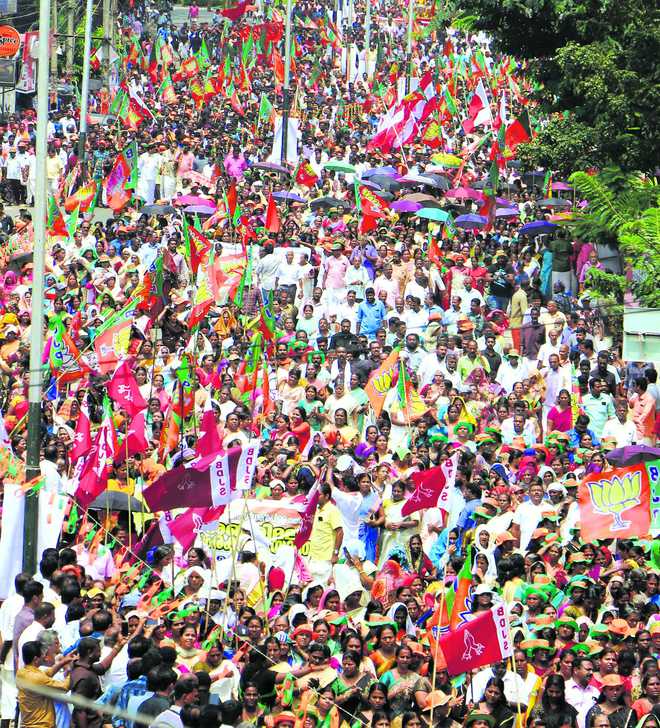Games politicians play
SreevalsanThiyyadi
The time lapse is too glaring to miss. September 28 was when the Supreme Court gave its verdict permitting women’s entry to the Sabarimala temple, yet it took a fortnight for the issue to politically snowball across Kerala.
Now, as there’s fatigue in the slugfest between parties, it’s perhaps time to audit the stand taken by the major three among them in the state. The ruling Left, the Opposition Congress and, most importantly in the context, the BJP, that has sensed a prospect to strengthen its foothold in Kerala where it has only one MLA in the 140-member unicameral legislature.
When Hindu organisations began protesting against the SC judgment, among the first to ridicule them was BJP leader T G Mohandas. The state convener of the party’s intellectual cell not only sent a tweetmaking fun of the demonstrators; he soon came on TV channels explaining how it was wrong to dub non-entry of women of a certain age bracket. It’s no “millennia-old convention” in Sabarimala that opens only on select occasions a year, Mohandas reiterated.
Shortly after, what Kerala saw was the BJP spearheading a stir deploring the judicial verdict and pressing the CPI(M)-led government to file a review petition. That led the RSS, too, to change stance. The party’s ideological parent, which had greeted the judgment in tune with its general secretary Suresh Joshi’s public stand expressed in March 2016, did a volte face: the Pinarayi Vijayan administration should respect the “sentiments of millions of devotees, including women”. For, the matter “was of a local temple tradition and faith”, not of gender inequality in places of worship.
In no time, the issue flared up. It turned into political turf war. Literally so, around Sabarimala, where chiefly pro-BJP volunteers gathered majorly to ensure that no women between the ages of 10 and 50 entered the hill shrine precincts during a five-day monthly ritual that concluded on October 24.
By then, the Congress, choosing to come out of its ambivalence after having supported the verdict, hardened itself against women entering the temple. After all, a soft Hindutva line from the days of titan leader K Karunakaran has helped the grand old party remain a major force in 1956-founded Kerala. Today, Ramesh Chennithala, as leader of the Opposition, keeps harping for a review petition (even as the AICC under party president Rahul Gandhi supports the women’s entry).
Simultaneously, Chennithala blames the present Pinarayi government for a “double standard”: even as the LDF administration reversed a pertinent affidavit the preceding Oommen Chandy regime had filed in February 2016, the Travancore Devaswom Board that administers south Kerala temples, including Sabarimala, had maintained its original stance.
Septuagenarian Vijayan, who came to power in May 2016, continues to state that his government has no option but to obey the judiciary. To him, the agitations of the Congress and BJP are mere political stunts, though not all in his party are happy with the ‘anti-devotee’ attitude.
The BJP has for a while been trying to boost its presence in Kerala. Incidentally, a Sabarimala-related issue had kindled the party’s spirit three-and-a-half decades ago. That was in 1982 when the Sangh Parivar stirred against a Christian move to build a church at Nilakkal, 25 km from Sabarimala. Cut to this mid-October: the same transit camp for Hindu pilgrims was where agitators assembled against the verdict and courted arrests.
The BJP sees the potential of a Kerala-level repeat of the 1990s frenzy it whipped up nationally over Ayodhya. Sabarimala could be the party’s Ram temple in the state, where Hindus form 54 per cent of the population amid a complicated caste matrix like elsewhere in the country. — ST









